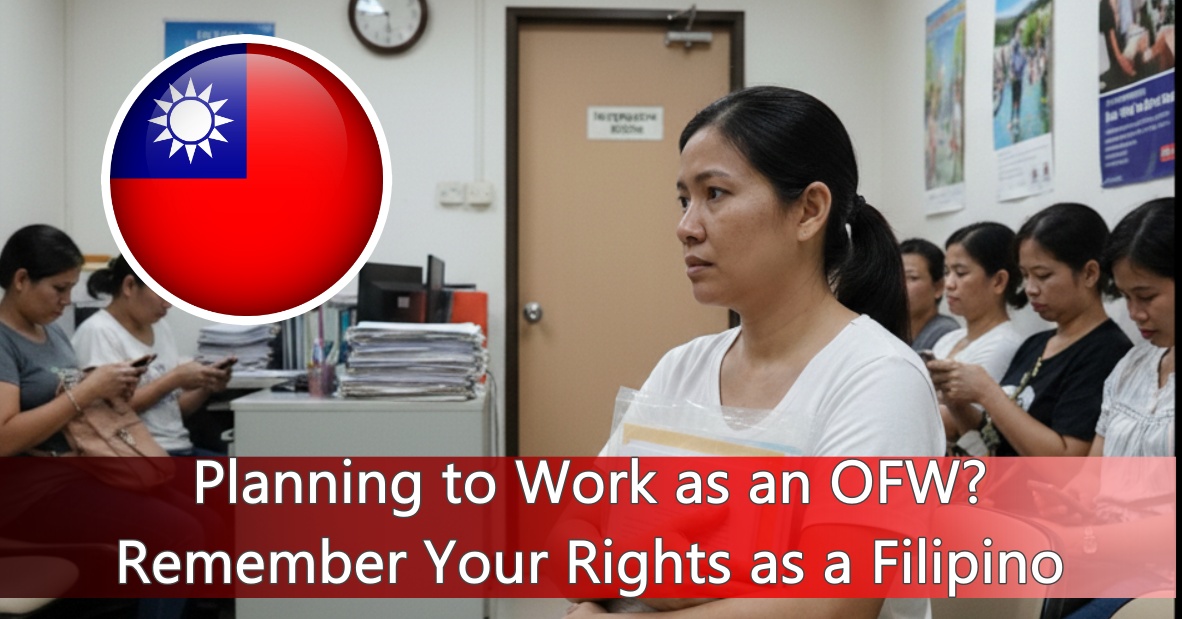Being an Overseas Filipino Worker (OFW) is more than earning a living in another country. It’s also about protecting your dignity, safety, and future. Many Filipinos abroad struggle not because they lack skills, but because they are unaware of the rights guaranteed to them under Philippine laws and international standards.
Here are 10 key rights every OFW should know, and how they look in real situations overseas.

1. Right to a Valid Employment Contract
Your contract must be verified and approved by the DMW (formerly POEA). This ensures your salary, benefits, and working hours are clearly stated. For example, if your contract says you’ll work as a caregiver, your employer cannot later force you into factory work or reduce your pay.
2. Right to Fair Wages
You are entitled to at least the minimum wage of the host country or the Philippine standard, whichever is higher. In places like Taiwan or Hong Kong, this means you should never accept a salary below what is mandated by their labor laws.
3. Right to Humane Working Conditions
You should have a safe workplace, proper food, and a clean living space. If you’re a domestic worker, you must be given your own sleeping area—not made to sleep in storage rooms or kitchens.
4. Right to Rest Days and Holidays
At least one rest day per week is standard. For example, domestic workers in Singapore often gather on Sundays for church or community activities. Employers cannot legally stop you from taking this day off unless properly compensated.
5. Right to Social Protection
Even abroad, you remain covered by SSS, PhilHealth, and Pag-IBIG if you continue contributions. Many OFWs set up voluntary payments online so they don’t lose benefits. Some host countries, like Taiwan, also honor social security agreements with the Philippines.
6. Right to Repatriation
If your contract ends, your employer goes bankrupt, or conflict breaks out in your host country, you must be repatriated at no cost to you. The Philippine embassy or consulate will coordinate your return.
7. Right to Legal and Consular Assistance
Embassies and consulates are required to assist OFWs in distress. This includes providing lawyers if you face unfair charges or helping you recover unpaid wages. Keeping embassy hotlines saved on your phone is a must.
8. Right Against Illegal Recruitment and Trafficking
You cannot be charged placement fees beyond what the law allows, nor be deceived into working a job different from what you signed for. If this happens, you can report the recruiter to the DMW or Philippine Overseas Labor Office (POLO).
9. Right to Vote
Through overseas absentee voting, you can still take part in Philippine elections. Traditionally, this meant visiting embassies or labor offices where polling stations were set up, such as in Taiwan or the Middle East.
Starting in the 2025 elections, however, the Commission on Elections (COMELEC) has also rolled out an online voting system for overseas Filipinos. This allows you to securely cast your ballot using a verified digital platform, making participation easier even if you live far from an embassy or have work schedules that prevent travel.
10. Right to Family and Reintegration Support
While you work abroad, your family can access OWWA programs like scholarships for your children and livelihood assistance. Once you return, reintegration services help you start a small business or find local employment.
Final Note
These rights are not privileges—they are protections you can demand. Always keep a copy of your employment contract, proof of OWWA membership, and contact details of the nearest embassy or consulate. Knowing your rights is the first step to standing strong, no matter where you are in the world.
